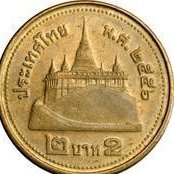BOT keeping a close watch on high-risk instruments
-
Recently Browsing 0 members
- No registered users viewing this page.
Announcements
-
Topics
-
Latest posts...
-
32
Ideas for a low speed room fan?
I settled on this Xiaomi one. Look like pretty good reviews re gentle speed, low noise and easy to clean. DC inverter which means you have very low and overall good speed control and torque. Basically an aircon fan but a lot easier to clean. Take off the back panel and the whole rotary turbine thing comes out to pressure wash outside. Got a pretty good deal too with Lazada coupons for 1600 baht delivered. Should be the ticket hopefully 🙂 Thanks all for the advice -
14
Now I'm getting older: I worry that my aging brain is making me feel crazy. (You too?)
Approaching 91 I'm beginning to enjoy your posts. Sure signs that my brain is going down the tubes. What was the question?😜 -
28
Trump vs. Taylor Swift: A Battle He’s Bound to Lose
How very wrong you are. Taylor Swift has been a popular star since 2006. Her popularity and influence has grown every year since then. 18 years as a superstar improving and expanding with each successive year. All done without financially harming anyone, declaring bankruptcy , or trash talking. One cannot be anti American and a Democrat at the same time, since the Democrat Party platform is pro USA. How convenient of you to worry about anti semitism. Maybe you could ask Some Democrats have non supportive views of Israel. Some representatives are nasty. No denying that. Unfortunately, the GOP is home to similar people. - Rep. Paul Gosar (R-Ariz.) scheduled a fund-raiser with Nick Fuentes and declared his “love” for Gab, a media platform popular with white nationalists, neo-Nazis and antisemites, and for “the communities that use it.” - Rep. Matt Gaetz (R-Fla.) aka Botox Man, invited Holocaust-denier Charles Johnson to be his guest at the State of the Union address. Gaetz appears frequently on “Infowars,” whose host, the infamous Alex Jones, has said, “It’s not that Jews are bad, it’s just they are the head of the Jewish mafia in the United States. They run Uber, they run the health care, they are going to scare you, they’re going to hurt you.” - Rep. Marjorie Taylor Greene (R-Ga.) suggested that a deadly wildfire in California may have been caused by a laser from space controlled by wealthy Jewish bankers. She shared a video quoting a Holocaust denier’s claim that “Zionist supremacists have schemed to promote immigration and miscegenation.” Greene attended the American First Political Action Conference in Orlando, organized by Fuentes, who questioned whether comparing Vladimir Putin to Hitler “was a bad thing.” She voted against the Antisemitism Awareness Act because it “could convict Christians of antisemitism for believing the Gospel that says Jesus was handed over to Herod to be crucified by the Jews,” a Scriptural reading that was repudiated by the Catholic Church and most Protestant dominations decades ago. - Rep. Elise Stefanik (R-N.Y.), insisted in 2022 that a statement by Carl Palladino, a Republican candidate for Congress, that “Hitler is the kind of leader we need today. We need someone inspirational,” was taken out of context. Stefanik also declined to comment on Trump’s dinner with Fuentes and Ye. - Shortly after Ye tweeted “death con 3 on Jewish people,” Sen.-elect Eric Schmitt (R-Mo.) tweeted “America needs a @kanyewest @KidRock tour.” Like the former president, who maintained he didn’t know anything about Nick Fuentes, and Charles Johnson. Schmitt pled ignorance about Ye’s “antisemitic comments.” - Kari Lake, who is running for the Senate from Arizona, once said meeting a Nazi sympathizer named Greyson Arnold was “a pleasure” and advised her followers to join her on Gab. - Trump has trafficked in antisemitic tropes. Dining with Kanye West at Maro Lago was inexcusable. Pot, kettle, black. -
32
Ideas for a low speed room fan?
Oh, so not a variable voltage regulator then like the one posted earlier. -
121
Foreign man knocks out Thai transwoman on Pattaya Walking Street - video
Just kick her in the balls. -
84
What really grinds your gears in Pattaya
How can you reckon Thailand as home, when you are here on limited very restricted permit to stay by year by year and never gain any rights whats so ever? You are a guest not a citizen. -
329
Revisiting History: The Unlikely Campaign to Vilify Winston Churchill
What I find interesting in all this CRAP is that people that were not there and have never lived under the dear of the NAzis of Extremist rule are 80 years later trying to frame what happened and make a moral judgement of what is right and wrong. It is like the white people in the UK and US decrying that Washington and most of the great leaders in history should be vilified because they hired slaves. In both cases the people then did what was necessary to survive. Was slavery wrong yes in some instances but was having a black butler and house staff wrong. Did lend lease do what was needed or did the country have enough WHO THE F CARES. Both the production of equipment and the borrowing of equipment was ecessary in order to win the war. While Lend Lease may not have been an overall winner or loser, it sure made a difference unti the Russian and British factories could start producing equipment. -
8
Melania Trump Defends Nude Modeling: A Celebration of the Human Form
He can always call on Stormy at $130,000 a throw, although she wasn't overly impressed with his little mushroom shaped number! -
3,400
President Kamala Harris
Nate Silver Issues 'Good News' for Kamala Harris on Electoral College Chances Nate works for Peter Thiel in a betting crypto websie Vance's billionaire mentor Corrupted opinion now https://www.newsweek.com/nate-silver-issues-good-news-electoral-college-donald-trump-election-1956228 -
43
158 dems vote against bill to deport illegals, who commit sex crimes
No, we dont know, despite what has already been posted on here that it appears you have not read. Please enlighten us why Dems voted against it, and why this particular piece of legislation is different to the laws that already exist in regard to this issue. -
57
Former Army Chief Set to Lead Neo-Conservative Party
Certainly looks like a jovial easy-going sort of a bloke, I wouldn't pay to much attention to all these malicious rumours about him. -
-
32
-
11
Homeless Woman Using Illegal Drugs Openly on Pattaya Street Raises Concerns Over City Image
These officials who claim this woman is tarnishing Patts good name need to undergo some serious drug testing. The rat's nest is not a family friendly resort. -
5,260
-
.png.3b3332cc2256ad0edbc2fe9404feeef0.png)


.thumb.jpg.9bcb39176551b2c1639c71549f3782b4.jpg)






Recommended Posts
Create an account or sign in to comment
You need to be a member in order to leave a comment
Create an account
Sign up for a new account in our community. It's easy!
Register a new accountSign in
Already have an account? Sign in here.
Sign In Now